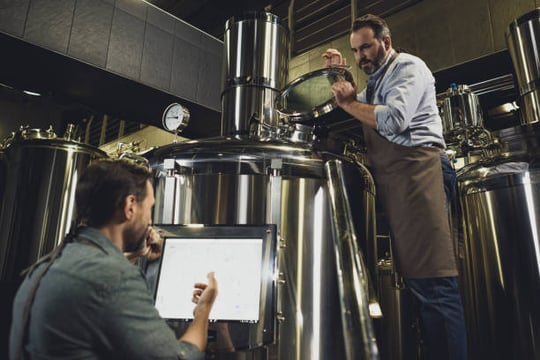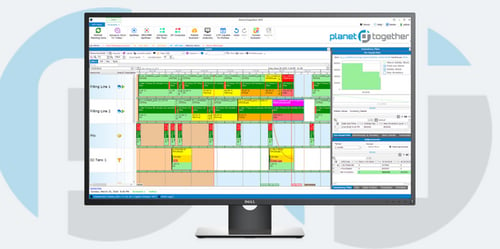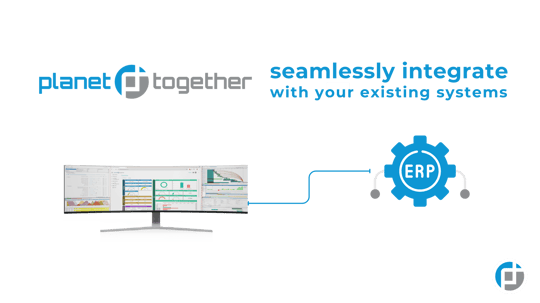
Data-Driven Scheduling: How APS Becomes the Orchestrator of Industrial IoT Insights in Food & Beverage Manufacturing
In the fast-paced, highly regulated, and margin-sensitive environment of Food and Beverage (F&B) manufacturing, the convergence of Industrial Internet of Things (IIoT) and Advanced Planning and Scheduling (APS) systems is no longer optional—it’s transformative. For Manufacturing IT leaders navigating this convergence, the key question is: How do we translate the torrents of real-time IIoT data into agile, optimized production schedules that balance throughput, safety, shelf life, and cost?
The answer lies in data-driven scheduling—with APS acting as the orchestrator of IIoT insights. By integrating systems like PlanetTogether APS with enterprise platforms such as SAP, Oracle, Microsoft, Kinaxis, or Aveva, Manufacturing IT teams can bridge the gap between raw operational data and intelligent scheduling decisions that optimize performance across the production ecosystem.
The Industrial IoT Evolution in Food & Beverage Manufacturing
IIoT technologies have given F&B manufacturers an unprecedented lens into their operations. Sensors and edge devices now monitor:
Equipment health and predictive maintenance conditions
Ingredient temperature, humidity, and safety compliance
Line speeds, machine uptime, and bottleneck rates
Energy consumption and carbon output
Packaging integrity and waste generation
While this ocean of data is valuable, without orchestration and context, it becomes digital noise. That’s where APS plays a vital role: aggregating, contextualizing, and actioning IIoT insights within the scheduling layer.

APS as the Data Orchestrator: From Sensors to Schedules
Advanced Planning and Scheduling systems like PlanetTogether are no longer siloed tools for static production planning. When integrated with IIoT-enabled platforms and core ERP/MES systems such as SAP, Oracle NetSuite, or Aveva’s industrial intelligence platform, APS becomes the intelligent conductor of factory performance.
Here’s how:
Real-Time Data Inputs Become Dynamic Scheduling Rules
With IIoT sensors feeding real-time data into MES or SCADA systems (such as those supported by Aveva or Microsoft Azure IoT Hub), PlanetTogether APS can ingest this data via integration connectors. For example:
If a mixer’s temperature sensor flags a rise beyond the ideal fermentation range, the APS engine can automatically reschedule dependent tasks to preserve product quality.
If a packaging line goes down, APS dynamically shifts orders to alternate lines—based on uptime data and shift availability pulled from SAP or Kinaxis S&OP data.
These real-time adjustments reduce response lag, preserve compliance, and improve yield.
Predictive Maintenance Becomes a Scheduling Constraint
A top concern for F&B manufacturers is unplanned downtime. With IIoT-driven predictive maintenance (PdM), systems like Oracle Fusion or Aveva PI System can forecast wear and tear. When PlanetTogether APS is integrated, it can:
Automatically insert preventive maintenance windows into the production plan
Schedule around anticipated failures or part replacements
Notify schedulers in advance to avoid last-minute shifts
By aligning production schedules with maintenance forecasts, downtime is minimized, and production becomes more resilient.
Energy-Aware Scheduling and Sustainability Goals
Food processing and refrigeration are energy-intensive. IIoT energy sensors paired with PlanetTogether can enable energy-efficient scheduling. Through integration with platforms like Microsoft Dynamics 365 or SAP’s sustainability control towers, PlanetTogether APS can:
Prioritize production during off-peak energy tariff periods
Avoid scheduling energy-intensive lines simultaneously
Align batch production with renewable energy availability
This supports both operational cost savings and decarbonization mandates—key to corporate ESG goals.

Integration Touchpoints: Unlocking Data Synergy
A key enabler of data-driven scheduling is the tight integration between PlanetTogether APS and enterprise platforms. Some powerful scenarios include:
PlanetTogether + SAP
SAP ERP or S/4HANA feeds master data (materials, BOMs, routings) while capturing shop floor updates. When integrated with PlanetTogether:
IIoT inputs from SAP Asset Intelligence Network enrich the scheduling context
Real-time alerts from SAP Predictive Maintenance influence plan revision
ATP (Available-to-Promise) logic can be directly influenced by IIoT-driven delays
PlanetTogether + Oracle
Oracle Cloud SCM or JD Edwards systems integrated with APS can:
Feed live machine or sensor telemetry into the planning algorithm
Use Oracle’s IoT Production Monitoring for smarter re-sequencing of jobs
Enable traceability from sensor alerts to batch-level scheduling decisions
PlanetTogether + Microsoft
Through Microsoft’s Power Platform, Azure IoT, or Dynamics 365:
Real-time dashboards visualize APS-driven responses to IIoT events
Power Automate workflows trigger from APS-suggested changes
Predictive models from Azure ML influence schedule optimization
PlanetTogether + Kinaxis
Kinaxis' RapidResponse enables scenario modeling across the supply chain. When integrated with PlanetTogether:
IIoT deviations feed upstream into demand-supply simulations
Capacity constraints driven by real-time machine data shape global supply decisions
Planners visualize both network-wide and plant-specific adjustments
PlanetTogether + Aveva
Aveva's industrial data platforms (e.g., PI System, Insight) collect IIoT data across the operation. When shared with PlanetTogether APS:
Batch transitions, OEE changes, or environmental alarms become APS triggers
APS can prioritize runs based on live product quality feedback
Historical IIoT data feeds scheduling heuristics to reduce waste and optimize yield
Key Benefits for Manufacturing IT Leaders
Integrating APS with IIoT data platforms doesn’t just create a smart factory—it creates a synchronized factory. For Manufacturing IT professionals, the advantages include:
Improved Operational Visibility: Unified view across IT, OT, and planning environments
Higher Scheduling Accuracy: Live adjustments aligned to real-world factory dynamics
Faster Response to Disruptions: From allergens alerts to freezer failure, schedule reacts in seconds
Boosted Equipment Efficiency: Proactive downtime and re-sequencing to extend asset life
Enhanced Compliance and Traceability: Data lineage from sensor to schedule to shipment
Support for Digital Twin Initiatives: APS forms the execution logic layer within digital twins
Food and Beverage manufacturers have invested in IIoT technologies to gather operational data. The next leap forward is making this data actionable in real time through intelligent planning. With PlanetTogether APS integrated into platforms like SAP, Oracle, Microsoft, Kinaxis, or Aveva, manufacturers move beyond connectivity toward true orchestration.
For Manufacturing IT leaders, this is the blueprint to transform production planning from a reactive exercise into a strategic, responsive, and sustainable process that meets the demands of today’s dynamic food markets.
Are you ready to take your manufacturing operations to the next level? Contact us today to learn more about how PlanetTogether can help you achieve your goals and drive success in your industry.